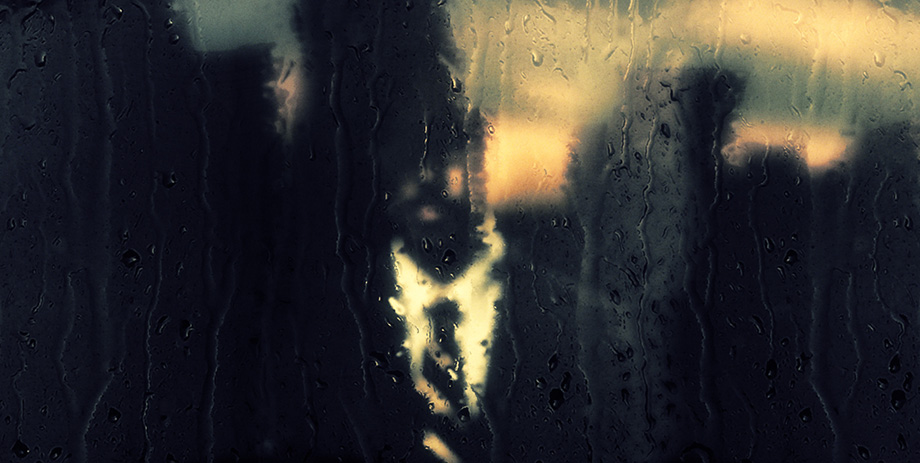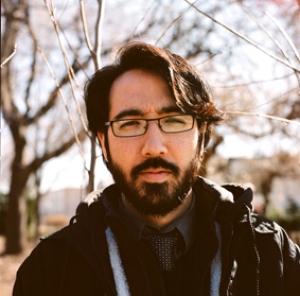Reviews include Irena’s Vow, The Beast, and Before I Change My Mind.
Interview: Clyde Gilmour designate Randall Okita
January 9, 2015
It’s September 14th, 2014, the last day of TIFF: a crowd of congratulators shift in their seats and crane their heads to catch an early glimpse of young director Randall Okita making his way to the stage.

His film, The Weatherman and the Shadowboxer, has just been announced the Best Canadian short film at the 2014 TIFF Awards Ceremony. He steps up to the podium and holds the award as though it were a newborn child; glancing at it with serene admiration and wonder and some curiosity.
Randall turns towards the audience and goes through a litany of thank-yous acknowledging supporters, patrons, friends and family. It’s obligatory but it’s sincere. Then, with the grace and eloquence of someone who has done this for years, Okita leans into the mike and says, “With your permission I would like to dedicate this film to my mother and all survivors who became adults and parents and showed us that there is a better way to love.”
Weeks later, Piers Handling, CEO of TIFF and this year’s recipient of the Clyde Gilmour Award, announced Okita as the recipient of the Technicolor $50,000 prize in goods and services. Thom Ernst caught up with Randall to discuss the designation and his year in review:
You had quite a successful year in 2014. What would you say were the highlights?
I think anytime you get to work with people you adore and look up to, as was the case making The Weatherman and the Shadowboxer, with the kind of collaborative support and guidance that we had from Michael Fukushima, Maral Mohammadian and the team at the National Film Board, it just doesn’t get any better. You can’t ask for more than this — to be able to make things you care about with people that you care about. We were also able to move forward with my first feature film, The Lockpicker, which we started shooting last year. When you make something that you are so proud of it’s so magical to see them get out into the world and have people start to react to them. We were so lucky to be able to present the film at the Toronto International Film Festival, and then to have the film win best Canadian short film and be named one of Canada’s Top Ten, as well as the incredible Prix Format Court award at the Festival du Nouveau Cinema, it’s unbelievable. I’m so excited for more people to see the work.

Is there a core group of people on this journey with you?
It’s always evolving and depends on the project, but I’ve been lucky to collaborate with Lodewijk Vos and Joseph Murray of Menalon Music as well as the artists at Studio 835 in Toronto. These are the kind of people that really become family, and I’ve learned so much from them about collaboration and life and making things. I’ve had great experiences and I hope to work with everyone again.
What kind of thoughts and feelings were going through your mind when The Weatherman and the Shadowboxer was announced as the Best Canadian Short at the TIFF Awards brunch?
I felt surprised and honoured. This movie is personal story and we really went for it in terms of making our own thing, unrestrained by conceptions of genre, so it was incredible to have people connect to it and react positively. I made the film for my family, and my mother passed away while we were in the process of completing the film, so I was thinking of her and sharing the joy of it with her as I know that she would be the most excited person in the room.
When accepting the award you took a moment to thank you mother and all survivors who became adults and parents and “taught us that there is a better way to love.” That is a profound if not provocative statement. Can you elaborate a bit on what those words mean to you and your family?
The film is about dealing with memories and conflicts and your idea of yourself. When young people grow up dealing with traumatic experiences, or with limited exposure to healthy relationships, sometimes you have to fight to reinvent yourself, and create better ways to relate to yourself and to your family. My mother was a great example of this for me, and in some small way I wanted to honour and celebrate that internal battle and the courage that it takes to… well, to make things better.
Given that The Weatherman and the Shadowboxer is a very personal film. How do you engage first, a crew to help you realize your vision and second, an audience to witness it?
I think the best way to the access the universal is through the specific, I mean, maybe this just means “write what you know” but I think in every challenge and story that is real and has its own smells and textures and time and place, there is always something that people will relate to, so I’d like to think that if you are careful and thoughtful about making something that is connected to you, and that holds meaning for you, some of that will come through.
Why go through the trouble incorporating so many images and techniques? Could your story not have been told by simplifying the process and sticking to a more standard structure and narrative?
This piece is a story with characters that are unable to speak about their feelings, about their experiences, and their struggle is an invisible one. I knew what I wanted it to be, and I feel I couldn’t have done it any other way. Once the images and the style were in my head, it was a matter of working with the incredible team at the NFB and at Eggplant Pictures to figure out how to make the images a reality.
What is it about those images and techniques that enhances the experience you hope to pass onto the audience?
I hope it’s a story that you feel as much as one that you are “told.” You have to be able to see the perspective of these two brothers, as they are lost in their own foggy ideas of themselves, in order to see how insurmountable that distance is between them.
And how is your 2015 shaping up so far?
I’m so excited I can barely breathe. We are working on a feature film called The Lockpicker, which I’ve written and I’m directing, and I have a gallery show coming up called Things I Can’t Tell You.
When you were informed of winning $50,000 in Technicolor post-production services, you responded by saying “It’s like Christmas all over again.” Tell me a bit about receiving that call and how your reaction.
Oh my goodness, I was so shocked. I stopped in my tracks. This is the most unexpected, incredible opportunity and honour that comes at a perfect time as we struggle to shoot my first feature film. I couldn’t be more happy or thankful.
The money is designated by this year’s Clyde Gilmour recipient, Piers Handling. How important has Piers and TIFF been to your career? To the career of young Canadian filmmakers?
There is no way to overstate how important Piers’ work, and the festival, has been, and is to me. It’s immeasurable. One of the first times I visited the City of Toronto, where I live now, was to attend this incredible event, to meet this community, to experience people experiencing film in this incredibly inspiring way. Listen, I feel like I’m just getting started, I’m the new guy, but I know enough to look at the kind of work Piers is doing and see that we are talking about passion that changes cities and generations… and the number of young Canadian filmmakers that benefit from it… it’s invaluable.
What does this kind of prize offer filmmakers beyond the obvious monetary advantages?
I guess we will see, but I feel incredible emboldened by the vote of confidence, to keep trying to create work that will stand up over time.
With Weatherman you utilized a variety of styles and influences to tell your story – do you hope to continue experimenting with the way film can tell a story, or might you try for something more traditional?
I hope to always experiment, to take some kid of risk. I mean, perhaps controlled, researched, planned risks, but they have to be risks. I’m not claiming to reinvent the wheel, but I hope to always do something that I haven’t done before, as I think that’s how the best work comes about.
Are you comfortable with the term “experimental” or do you see your style as something other than that?
Okita: I certainly don’t see it as a bad thing, although it certainly has negative connotations for some and has become a bit of a catchall term for some. I think that if you are making a film, if you are writing down a story, an idea, and then getting a number of people to come out and perform and more people to record and then to try and wrangle this whole process into a piece of work, how is that not an experiment?
Tell me a bit about The Lockpicker.
It’s about a teenage thief deciding if he is going to commit a murder. We are collaborating with schools to get teens involved in making the film, working with teen performers, some with little or no experience in front of the camera, and we are working hard to create a process and film that are about the experience of trying to grow up.



